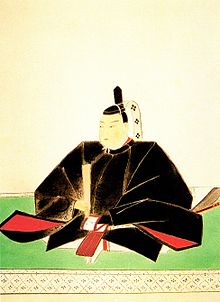Tokugawa Tadanaga


Tokugawa Tadanaga (徳川 忠長, 1606 – January 5, 1634) was a Japanese daimyō of the early Edo period. The son of the second shōgun Tokugawa Hidetada, his elder brother was the third shōgun Tokugawa Iemitsu.
Biography
[edit]Often called Suruga Dainagon (the major counsellor of Suruga), Tadanaga was born in 1606. His birth name was Kunichiyo (国千代). The date of his birth is uncertain, and is variously given as May 7, June 1, and December 3. Blessed with military and intellectual prowess and a generosity of spirit, he received support from his mother, Oeyo (or Sūgen'in), who favored him over her other son Takechiyo (the future Iemitsu) to become the third shogun. Just after the death of their father shogun Hidetada, Iemitsu accused his brother, already under house arrest in Kōfu, of insanity, stripped him of all possessions and offices, leaving him to commit seppuku.[1]
It is also said that Tadanaga's face was similar to that of his cousin Toyotomi Hideyori and for that reason Ieyasu hated and feared Tadanaga.
He married Masako (1614–90) later Shōkō-in, the daughter of Oda Nobuyoshi (1584–1626), who was the grandson of Oda Nobunaga through Oda Nobukatsu.
The Suruga Dainagon Residence was close to Honmaru enceinte of Edo Castle to the northwest, and is depicted on the upper right side of the "View of Edo" folding screens from the 17th century.
Events
[edit]- 1606: Born to Hidetada and Sūgen'in
- 1624: Appointed daimyō of Suruga, Tōtōmi, and Kai Provinces, with a rating of 550,000 koku in the Kōfu Domain
- 1626: Kills a retainer and commits other acts of violence
- 1631: Placed under house arrest in Kōfu
- 1632: Stripped of office
- 1634: Commits seppuku under arrest in Takasaki
See also
[edit]References
[edit]- ^ Beatrice M. Bodart-Bailey, "The Dog Shogun" p. 14
